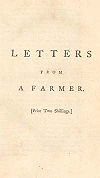
Letters from a Farmer in Pennsylvania
Encyclopedia

John Dickinson (delegate)
John Dickinson was an American lawyer and politician from Philadelphia, Pennsylvania and Wilmington, Delaware. He was a militia officer during the American Revolution, a Continental Congressman from Pennsylvania and Delaware, a delegate to the U.S. Constitutional Convention of 1787, President of...
(1732–1808) and published under the name "A Farmer" from 1767 to 1768. The twelve letters were widely read and reprinted throughout the thirteen colonies, and were important in uniting the colonists against the Townshend Acts
Townshend Acts
The Townshend Acts were a series of laws passed beginning in 1767 by the Parliament of Great Britain relating to the British colonies in North America. The acts are named after Charles Townshend, the Chancellor of the Exchequer, who proposed the program...
. The success of his letters earned Dickinson considerable fame.
While acknowledging the power of Parliament
Parliament of Great Britain
The Parliament of Great Britain was formed in 1707 following the ratification of the Acts of Union by both the Parliament of England and Parliament of Scotland...
in matters concerning the whole British Empire
British Empire
The British Empire comprised the dominions, colonies, protectorates, mandates and other territories ruled or administered by the United Kingdom. It originated with the overseas colonies and trading posts established by England in the late 16th and early 17th centuries. At its height, it was the...
, Dickinson argued that the colonies were sovereign in their internal affairs. He thus argued that taxes laid upon the colonies by Parliament for the purpose of raising revenue, rather than regulating trade, were unconstitutional.
In his letters, Dickinson foresees the possibility of future conflict between the colonies and Great Britain, but urges against the use of violence:
According to Mel Bradford
Mel Bradford
Melvin E. "Mel" Bradford was a conservative political commentator and professor of literature at the University of Dallas....
, "The manner of Dickinson’s twelve letters is well suited to their matter. In form they belong to the
'high' or 'sober' tradition of English political pamphleteering — as does Common Sense
Common Sense (pamphlet)
Common Sense is a pamphlet written by Thomas Paine. It was first published anonymously on January 10, 1776, during the American Revolution. Common Sense, signed "Written by an Englishman", became an immediate success. In relation to the population of the Colonies at that time, it had the largest...
to its 'rough and ready' but popular counterpart." Bradford argued that the letters had antecedents in the writings of "Milton
John Milton
John Milton was an English poet, polemicist, a scholarly man of letters, and a civil servant for the Commonwealth of England under Oliver Cromwell...
, Swift
Jonathan Swift
Jonathan Swift was an Irish satirist, essayist, political pamphleteer , poet and cleric who became Dean of St...
, Addison
Joseph Addison
Joseph Addison was an English essayist, poet, playwright and politician. He was a man of letters, eldest son of Lancelot Addison...
, and Burke
Edmund Burke
Edmund Burke PC was an Irish statesman, author, orator, political theorist and philosopher who, after moving to England, served for many years in the House of Commons of Great Britain as a member of the Whig party....
," as well as the authors of Cato's Letters
Cato's Letters
Cato's Letters were essays by British writers John Trenchard and Thomas Gordon, first published from 1720 to 1723 under the pseudonym of Cato , the implacable foe of Julius Caesar and a famously stubborn champion of republican principles....
and the Roman statesman Cicero
Cicero
Marcus Tullius Cicero , was a Roman philosopher, statesman, lawyer, political theorist, and Roman constitutionalist. He came from a wealthy municipal family of the equestrian order, and is widely considered one of Rome's greatest orators and prose stylists.He introduced the Romans to the chief...
.

